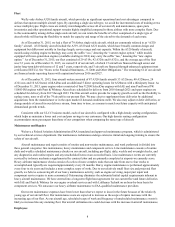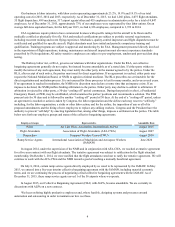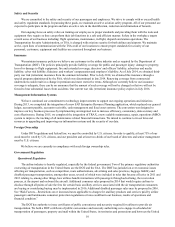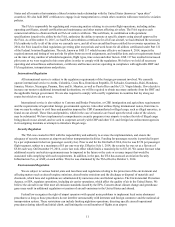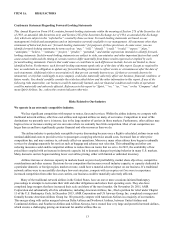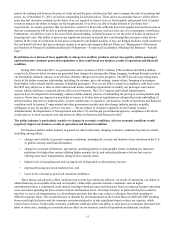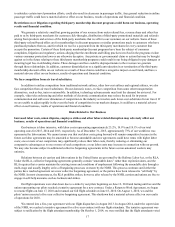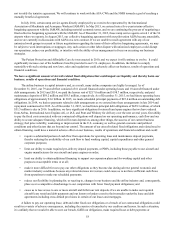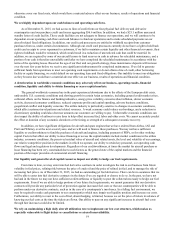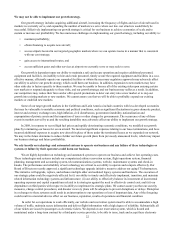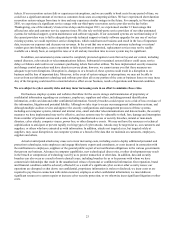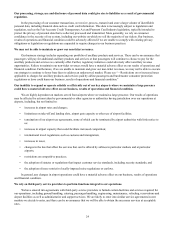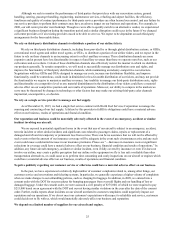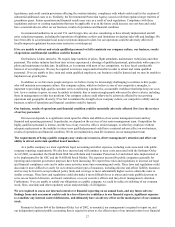Spirit Airlines 2015 Annual Report Download - page 18
Download and view the complete annual report
Please find page 18 of the 2015 Spirit Airlines annual report below. You can navigate through the pages in the report by either clicking on the pages listed below, or by using the keyword search tool below to find specific information within the annual report.18
not to ratify the tentative agreement. We will continue to work with the AFA-CWA and the NMB towards a goal of reaching a
mutually beneficial agreement.
In July 2014, certain ramp service agents directly employed by us voted to be represented by the International
Association of Machinists and Aerospace Workers (IAMAW). In May 2015, we entered into a five-year interim collective
bargaining agreement with the IAMAW, including material economic terms, and we are continuing the process of negotiating a
final collective bargaining agreement with the IAMAW. As of December 31, 2015, these ramp service agents served 1 of the 56
airports where we operate. In August 2015, our collective bargaining agreement with our pilot union ALPA became amendable,
and we are currently in discussions with ALPA on a new contract. If we are unable to reach agreement with any of our
unionized work groups in current or future negotiations regarding the terms of their collective bargaining agreements, we may
be subject to work interruptions or stoppages. Any such action or other labor dispute with unionized employees could disrupt
our operations, reduce our profitability, or interfere with the ability of our management to focus on executing our business
strategies.
The Patient Protection and Affordable Care Act was enacted in 2010, and we expect it will continue to evolve. It could
significantly increase cost of the healthcare benefits provided to our U.S. employees. In addition, the failure to comply
materially with such existing and new laws, rules and regulations could adversely affect our business, results of operations and
financial conditions.
We have a significant amount of aircraft-related fixed obligations that could impair our liquidity and thereby harm our
business, results of operations and financial condition.
The airline business is capital intensive and, as a result, many airline companies are highly leveraged. As of
December 31, 2015, our 79 aircraft fleet consisted of 61 aircraft financed under operating leases and 18 aircraft financed under
debt arrangements. In 2015 and 2014, we paid the lessors rent of $217.0 million and $198.7 million, respectively, and paid
maintenance deposits of $59.2 million and $58.5 million, respectively. As of December 31, 2015, we had future operating lease
obligations of approximately $1.6 billion. In 2015, we made scheduled principal payments of $25.4 million on outstanding debt
obligations. In 2014, we had no payments related to debt arrangements as we entered into these arrangements in late 2014 and
repayment commenced in 2015. As of December 31, 2015, we had future principal debt obligations of $659.3 million, of which
$51.5 million is due in 2016. In addition, we have significant obligations for aircraft and spare engines that we have ordered
from Airbus, International Aero Engines AG, or IAE, and Pratt and Whitney for delivery over the next several years. Our ability
to pay the fixed costs associated with our contractual obligations will depend on our operating performance, cash flow and our
ability to secure adequate financing, which will in turn depend on, among other things, the success of our current business
strategy, fuel price volatility, weakening or improvement in the U.S. economy, as well as general economic and political
conditions and other factors that are beyond our control. The amount of our aircraft related fixed obligations and related need to
obtain financing could have a material adverse effect on our business, results of operations and financial condition and could:
• require a substantial portion of cash flow from operations for operating lease and maintenance deposit payments,
thereby reducing the availability of our cash flow to fund working capital, capital expenditures and other general
corporate purposes;
• limit our ability to make required pre-delivery deposit payments, or PDPs, including those payable to our aircraft and
engine manufacturers for our aircraft and spare engines on order;
• limit our ability to obtain additional financing to support our expansion plans and for working capital and other
purposes on acceptable terms or at all;
• make it more difficult for us to pay our other obligations as they become due during adverse general economic and
market industry conditions because any related decrease in revenues could cause us to not have sufficient cash flows
from operations to make our scheduled payments;
• reduce our flexibility in planning for, or reacting to, changes in our business and the airline industry and, consequently,
place us at a competitive disadvantage to our competitors with fewer fixed payment obligations; and
• cause us to lose access to one or more aircraft and forfeit our rent deposits if we are unable to make our required
aircraft lease rental and debt payments and our lessors or lenders exercise their remedies under the lease and debt
agreements including cross default provisions in certain of our leases and mortgages.
A failure to pay our operating lease, debt and other fixed cost obligations or a breach of our contractual obligations could
result in a variety of adverse consequences, including the exercise of remedies by our creditors and lessors. In such a situation,
it is unlikely that we would be able to cure our breach, fulfill our obligations, make required lease or debt payments or


